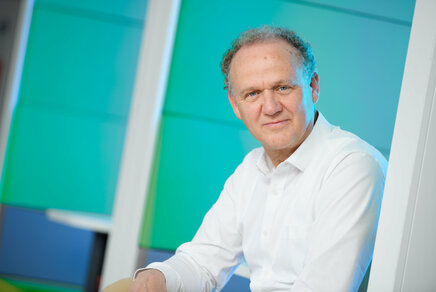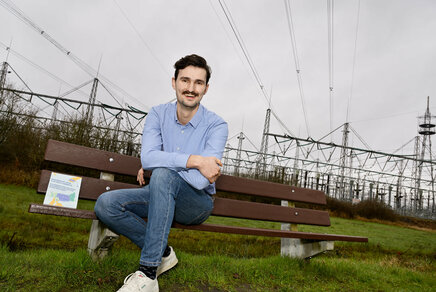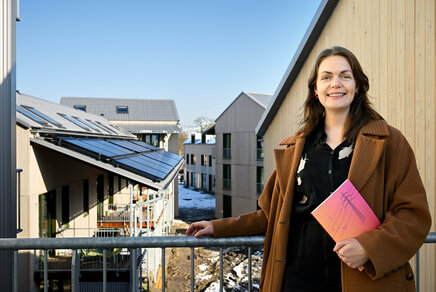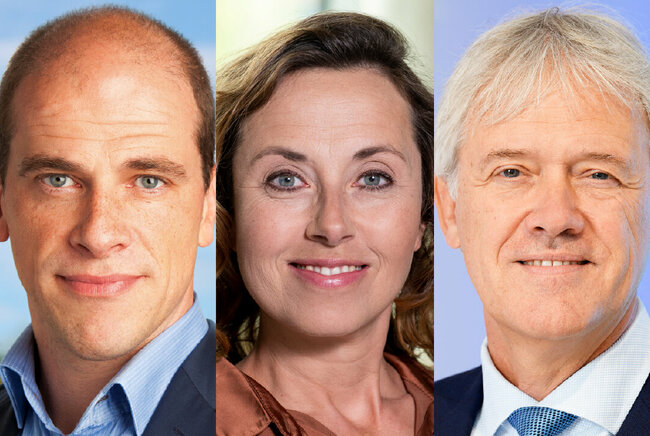Diederik Samsom, Marieke Blom and Peter Wennink to speak at opening of the academic year on future earning power
Can we create new earning power in Europe by committing to investment in the knowledge and technologies essential for our major societal transitions?
Investing in major societal transitions and the creating of new earning power in Europe will take center stage on September 4th during the opening of TU/e's academic year, which will be discussed by three prominent guests; namely Diederik Samsom (chief of cabinet of departing euro commissioner Frans Timmermans and former PvdA party chairman), Marieke Blom (chief economist and global head of research at ING Group) and Peter Wennink (CEO of ASML).
Europe has embarked on several mega-transitions in recent years, with the climate and energy transitions being the main challenges. These transitions involve a complicated process, but they also offer a unique opportunity for both the Netherlands and Europe to develop a new earning capacity, one that strengthens the competitive position of the Netherlands and Europe, and leads to additional high-quality jobs and new, sustainable technologies and products.
But how do we develop a balanced earning model based on a healthy environment and society? How do we ensure that we keep everyone on board, that transitions remain affordable, and that innovations emerge as planned? How do we avoid being outdone in terms of innovation by other regions of the world? And what role can the Brainport region play in this? These are some of the questions that will be discussed during the opening of Eindhoven University of Technology's academic year.
One of the most competitive economies
"The Netherlands has one of the most competitive economies in Europe, and the Brainport region plays a crucial role in this. As a country and region, we want to be at the forefront of the transition to clean technology. The question is how we can achieve this goal in a cost efficient manner, within a reasonable timeframe, and without compromising our prosperity. The opening of the academic year in Eindhoven is the perfect time to discuss this theme with some key players," clarified TU/e Board Chairman Robert-Jan Smits.
TU/e itself contributes to the future earning power of the Netherlands and Europe in several ways, including via research into key technologies like quantum, photonics, semiconductors, sustainable materials, AI, and energy storage and energy conversion. Moreover, the university plays an important role in the education of talent for the high-tech industries based in Brainport and beyond. Smits: "The lack of technical personnel is increasingly becoming a bottleneck in making our economy more sustainable. That is why it is important that we can deliver more engineers."
The guests
Diederik Samsom: "It is crucial to keep our society and economy running in a clean way. Apart from that, the transition process will only succeed if it is equitable. Otherwise, it will not work. Hence, the motto ‘Leave no one behind’. In the Netherlands the equitable distribution of transition costs is already quite a struggle, but in Europe where income differences within countries and between countries are even greater, the task is bigger. In addition, it is good if business gets investment certainty, because then the changes go much faster. We can no longer afford the fickleness in policy that politics has often shown.”
Marieke Blom: “Our economy has to change, and our consumption has to change. That change is positive in the long run, but the short-term (economic) losers will make themselves known. The trick is to unite the winners and show that it can be done. By the way, the change we have to go through is made far too big in the debate. I have the impression that that puts many people off. The change is manageable, just look at how agile the Netherlands has proven to be in recent decades."
Peter Wennink: "In the chip industry, the energy transition is an important growth factor because different types of chips are essential in solar panels, electric cars and wind turbines. The demand for green energy will only increase. There is so much knowledge and expertise in this field in Europe, but also especially in the Brainport region. The energy transition thus offers Europe the opportunity to play a leading role here worldwide. And if Europe can learn anything from Brainport, it is that this position can be strengthened when industry, governments, and academia work together and continue to invest in innovation."
Chair of the Future
During the opening of the academic year, TU/e-students will hand over the so-called ‘Chair of the Future’. Through this initiative, which is widely supported by students, professors and other members of the university community, the students aim to put a sustainable future at the center of decision-making processes at the university. By giving the physical chair a place at the conference table, decision-makers within TU/e are constantly reminded of the crucial importance of sustainability.
Time and place
The opening of Eindhoven University of Technology's academic year will take place on Monday September 4th 2023 in the Blue Hall of the Auditorium Building from 3:00 to 4:30 p.m. The entire event program can be followed via the livestream by media partner Science|Business. Additionally, there are limited seats, which require a ticket or invitation. Check out tue.nl/oay.
Media contact
More on Sustainability



